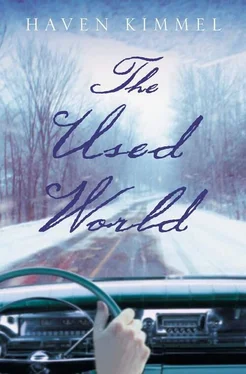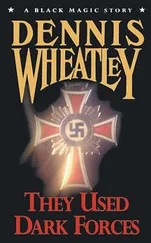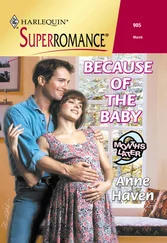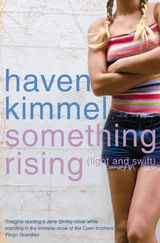There was Italy in the car, where her father had served as a field surgeon. He had brought home with him a leather valise, a reliquary urn, and a collection of photographs that revealed a sky as bright as snow over rolling hills in Umbria, a greenhouse in Tuscany. These items belonged to Albert alone and marked him as a stranger. Here was the edge of Hazel, here the surface of her father. And because of Albert’s past, Albert’s private history, the valise that was his and his alone, something else was in the car with them, a patient and velvet presence that vanished as soon as Hazel dared glance its way. It was the war years themselves, a house without men, a world without men. She tried, as she had tried so many times before, to touch a certain something that she had once thought was called I Got to Sleep With Mother in the Big Bed. That wasn’t it. It wasn’t the sweet disorder her mother had allowed to rule each day; it wasn’t that Caroline had kept the clinic up and running alone. It was somewhere in the kitchen light, yellowed with memory, and tea brewed late at night. Women sat around the table in their make-do dresses, hair tied back in kerchiefs. There was a whisper of conversation like a slip of sea rushing into a jar and kept like a souvenir, and Hazel didn’t know what they had said. But she knew for certain that women free of fathers speak one way and they make a world that tastes of summer every day, and when the men come home after winning the war—or even if they don’t come home—the shutters close, the lipstick goes on, and it is winter, again.
“It won’t snow now, will it?” Caroline said, lit with the night’s cold delicacy.
“Not now.” Albert tapped out the ashes of his pipe, and made the turn into the lane that would lead to his family’s home.
The quarter-mile drive was pitted already from this winter’s weather. Hazel studied, on either side of the car, the rows of giant old honey locusts, bare and beseeching against the sky. She could see the automobile as if hovering above it, the sleek black Ford whose doors opened like the wingspan of that other kind of locust, and whose grill beamed like a face. The car seemed friendly enough from a distance, but up close the nose was like an ice cream cone stuck into the metal framework, the sweet part devoured and just the tip of the cone remaining. The headlights lit up were Albert’s eyes behind his glasses, and what he and the car were angry about, no one bothered to explain.
Hawk’s Knoll was sixty acres on a floodplain leading back to the Planck River; a four-story barn; a metal silo once used for target practice; and a hulking house completed just two months before the first shots were fired at Fort Sumter. Albert Hunnicutt’s Queen Anne boasted a wraparound front porch with both formal and service entries. The doors and windows sparkled with leaded glass, and the fish-scale trim was painted every other year. The three rooflines were so steep and the slate shingles so treacherous that replacing one required a visit by two Norwegian brothers, who set up elaborate scaffolding, tied themselves to each other, and still spent a fair amount of time cursing in their native tongue. The front portion of the house and all of the upstairs were private, but the maid’s wing at the back had been converted to her father’s surgery. All day long patients came and went, sometimes stopping for a cup of coffee in the Hunnicutts’ kitchen. But at night the house and lanes were deserted.
The family stepped into the foyer of the formal entrance, where they hung up their coats and scarves; an inner door was closed against the parlor, the gas fire, and the flawless late-Victorian tableaux her parents had created. “On up to bed,” her father said, glancing at his watch. “It’s late.” They had stayed too long at the Chamber of Commerce Christmas party, her father unable to tear himself away from the town men. Albert came alive under their gaze, stroking the mantle of the European Theater he wore like the hide of an animal.
“Brush your teeth first.” Caroline kissed the top of Hazel’s head, cupped her palm around the back of her daughter’s thin neck, as if passing a secret on to another generation.
“Good night,” Hazel told both her parents, without a thought toward argument. She was not merely—then—obedient and dutiful, but anxious for the solitude of the nursery, regardless of whether the skin of the room, as she’d come to think of it, had grown onerous. She climbed the wide, formal front staircase, holding on to the banister against the slick, polished steps. Portraits of her ancestors, thin-lipped and metallic, watched her pass, up, up.
At the top of the stairs she paused in the gloom; the gaslights were now wired with small amber bulbs, three on each side of the hallway. To the right was the closed door of her father’s study, and to the left, door after door—bedrooms, bathrooms, the attic, closets, the dumbwaiter. Hazel walked silently down the Oriental runner and stopped in the prescribed place. She centered her feet on the pattern, closed her eyes, and wished—even this close to her tenth birthday she was not above wishing—and lifted her arms until they formed a straight angle; she could tell before she looked that she hadn’t done it, couldn’t yet or maybe ever. There was still nearly a foot of space between the walls and her fingertips. To touch both sides at once: that was what she had wanted for as long as she could remember, and it was an accident of birth and wealth that had left her stranded in a house too large, a hallway far too wide, for her to ever accomplish it.
The nursery was unchanged, unchanging. In one corner were her toys, preserved and arranged by Nanny to suggest that a little girl (who was not Hazel) had just abandoned her blocks, her paper dolls. The tail of the rocking horse was brushed once a week, though Hazel did nothing to disturb it. The dolls were arranged in their hats and carriages. At the round table the teddy bears and the rabbit were about to take tea out of Beatrix Potter porcelain, silver rims polished bright.
The walls of the nursery were painted gray; the floor a muted red. A teacher at the college had been employed to paint a scene a few feet from the ceiling, and traveling all around the room: a circus train with animals and acrobats and clowns. Trailing the caboose were six elephants of various sizes, joined trunk to tail. Hazel’s white iron bed frame was interwoven with real ivy—Nanny tended to that as well. Hazel did not love the bed, did not love the down comforter with feminine eyelet trim. What was hers, what was of her, were the small school desk and chair, and the white bookcase where she kept the E. Nesbit books her mother had given her over the years.
She slipped out of her shoes and party dress and hung them in the closet, then claimed the flannel nightgown from where it warmed over the back of the rocking chair near the radiator. Her bed was under a mullioned casement window, and each night Hazel moved her pillows from the headboard to the feet so she could lie awake and look at the sky. Such behavior was baffling to Nanny, who would exclaim each morning, finding the pillows at the wrong end of the bed, that Hazel was a silly girl.
Standing on the bed, she opened the window and leaned over the sill. The air was cold enough to cast the ground below her into sharp distinction; each tree branch looked knifelike and black. There were fifteen acres between the house and the road. From what Hazel could see, nothing and everything moved in the mid-December wind. A swirl of leaves tumbled down the lane, a barn cat leapt out of the shadows and back again. Hazel got out of bed and turned off the light, then settled against her pillows with the window still open. The moon was high, so she could see its light but not its face. Her best friend, Finney, had a favorite game called What If? What if a robber broke into your house? What if you were stranded on a mountaintop and had to eat human flesh? What if you were charged by a lion? Lying in the moonlight, Hazel thought the real question should have been What if… without anything following. Because that was what scared Hazel most.
Читать дальше












